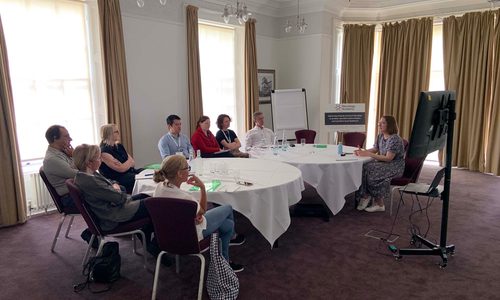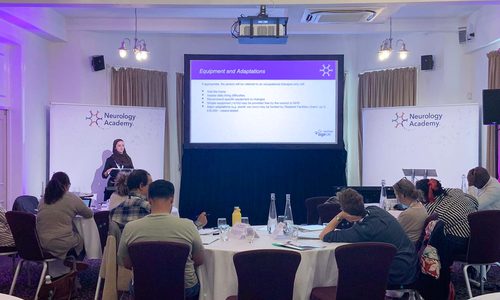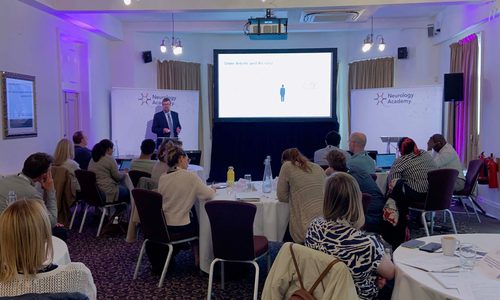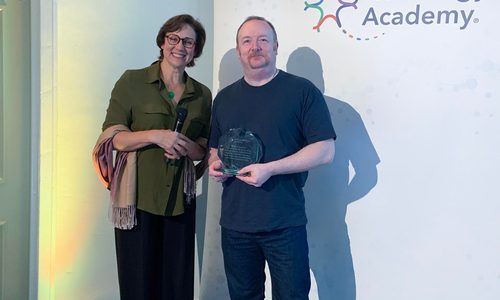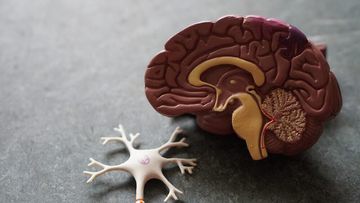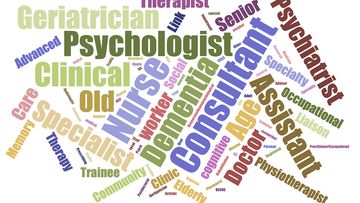Congratulations to the Dementia MasterClass 8 intermodule project winner
Event reportsA huge congratulations to all the graduates of Dementia MasterClass 8. The second module of the course took place in Sheffield in June, bringing together delegates for two packed days of learning, discussion and project sharing.
The programme featured a comprehensive programme of expert-led teaching sessions covering a wide range of topics including sensory impairment, rapidly progressive cognitive syndromes, young onset dementia, end of life care, and the latest on disease-modifying therapies. Delegates also took part in interactive workshops on the MoCA, managing delirium in acute hospital settings, and the practicalities of liaison care.
“Every minute was thoroughly enjoyed. One of the most articulate learning experiences I've had in a very long while, thank you!”
“Extremely interesting. The course is provided by such passionate, knowledgeable specialists that really manage to inform and inspire! Great!”
Delegate feedback, Dementia MasterClass 8
A highlight of the event was undoubtedly the showcase of the workplace projects. Since the first module in September last year, delegates have been working on projects aimed at tackling real issues in their local services. The range of ideas and the enthusiasm behind them were impressive, with each poster reflecting a clear commitment to improving dementia care.
From GP-led brain health clinics in Bristol and hospital-based diagnosis in Sunderland, to culturally inclusive assessment tools in Manchester, the work highlights both the challenges and opportunities in ensuring timely, equitable care. Projects have looked at people with neurodegenerative parkinsonism, who have a high risk of developing dementia, and the often under-recognised need for structured follow-up after delirium episodes. Others explored how improved clinical pathways, enhanced documentation, and greater collaboration between sectors can support earlier diagnosis and better outcomes.
"This course has made a significant impact on my practice and has been responsible for the improvement in the quality of care I provide to my dementia patients from initial assessment to post-diagnostic support."
"Not just food for thought, but inspiration to act!"
Delegate feedback
Winning project
Delegates voted for their favourite project, and we’re pleased to announce the winner: Dr Chris Lear, GP partner at North Bristol NHS Trust, with his project "Is patient-initiated follow-up for those diagnosed with MCI good enough in the era of DMTs and an increasing evidence base for risk factor modification?".
Chris’ project looked at how well patients with mild cognitive impairment (MCI) are being followed up in primary care. By running pilot memory/brain health clinics, Chris found that MCI and dementia were often under-coded, and he identified long intervals since last reviews and limited active management of dementia risk factors. Many patients hadn’t had a cognitive review in over two years, and some had progressed to dementia without this being picked up. He recommends active MCI registers, regular reviews and stronger links between primary care and brain health services. Based on the success of his project, the health group has agreed to continue the clinics when capacity allows.
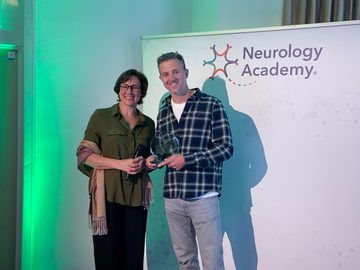
Prof Iracema Leroi and Dr Chris Lear
Runners-up
Mental health profile and practice in an older persons’ movement disorder clinic: a retrospective electronic patient record audit
Dr Glyn Scott, consultant geriatrician, Liverpool University Hospitals NHS Foundation Trust
This project audited the mental health and dementia burden in a central urban movement disorder clinic. Findings showed that over 70% of patients with neurodegenerative parkinsonism also faced mental health challenges, including dementia, psychosis, depression and anxiety. Glyn reviewed how well these issues are being picked up and managed, and whether services are ready to shift from reactive treatment to more proactive brain health care.
Review of use of antipsychotic medications for management of non-cognitive symptoms in care home patients with dementia in Southeast Essex
Dr Sunday Cephas, older adult specialty doctor & Dr Ann Ige, consultant psychiatrist, Essex Partnership NHS Foundation Trust
This project explored how antipsychotics are being used in care homes for people with dementia. It assessed prescribing patterns, how often reviews take place, and whether structured tools like ABC charts are used. While antipsychotics are sometimes needed, the review highlighted the risks of long-term use and the need for consistent monitoring.
Education with impact
It was fantastic to see the range of work being done by this year’s delegates. Each project showed a clear commitment to improving dementia care across a variety of settings and roles. Together, they’re a great example of how education can drive real change in clinical practice. We have compiled an ‘education with impact’ report featuring all of the projects from this cohort. It also highlights how many of them align with key priorities in the recently launched NHS 10-Year Health Plan, targeting practical interventions that support the key aims of the plan.
Education with impact report
“It is deeply rewarding to see how the Dementia Academy continues to empower healthcare professionals to deliver better, timelier, and person-centred care. The projects showcased in this report are a testament to the transformative power of education when combined with clinical leadership and collaboration. From addressing health inequalities to pioneering new models of care, these initiatives reflect a growing commitment to real-world change. As academic director, I am incredibly proud of the innovation and impact being driven by our delegates and faculty – and of the role the Academy plays in supporting a future where people affected by dementia can live well for longer.”
Prof Iracema Leroi, academic director, Dementia Academy
All project posters can also be viewed online here. Congratulations again to our finalists and to all our delegates for their outstanding contributions!
This meeting has been part funded by sponsorship from Eisai Limited. The sponsor did not initiate this meeting, nor has Eisai had any input into the organisation or educational content of this meeting.
Related articles
Promoting prevention, supporting management
Led by proactive clinicians determined to see improvement in the way we prevent, diagnose and manage dementias, Dementia Academy supports healthcare professionals with the latest tools, resources and courses to do just that.

